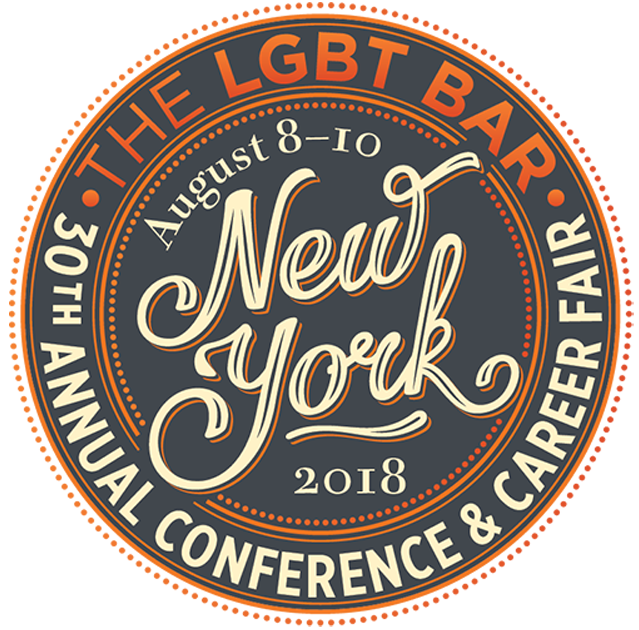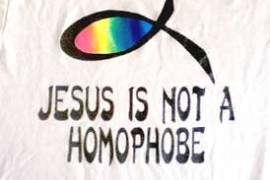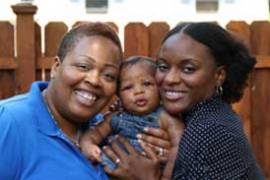Join Lambda Legal at the National LGBT Bar Association's 30th Annual Conference & Career Fair (Lavender Law) this week! Here's where you can find our staff (names are bolded).
Additionally, Lambda Legal's very own Help Desk attorney Huong Lam will be recognized by the National LGBT Bar Association's 40 Best Lawyers Under 40 Awards at this year's Lavender Law. Congratulations, Huong!
Wednesday, August 8, 2018
9:00am – 10:30am
It Was Never About The Cake: Public Accommodations and Religious Refusals in the Aftermath of Masterpiece Cakeshop
The Supreme Court’s decision in Masterpiece Cakeshop v. Colorado Civil Rights Commission is a narrow ruling, tailored at core to remedy the wrong the majority found in the Colorado Civil Rights Commission’s evaluation of whether baker Jack Phillips’ religious objections to making a wedding cake for Charlie Craig and Dave Mullins’ wedding should trump their protections under Colorado’s civil rights statute. While the Court made clear that its decision hinged on the Constitutional mandate that a State may not exhibit “hostility” in its laws, regulations, or enforcement thereof, it nonetheless opened the door to the potential for a flood of litigation seeking to resolve the tension between those who wish to have the freedom to discriminate in the name of religion, and those, such as the LGBT community, who wish to fully and freely access places of public accommodation under the protection of state and local laws. This plenary session will address a number of issues that remain after the decision, including what the decision means for governmental agencies such as the Colorado Commission assessing such claims in future; how the new claims being advanced by anti-equality forces differ doctrinally from classic religious conscience claims; how to address and advocate in partnership with other communities potentially harmed by the growing push to use private religious beliefs to discriminate in public and quasi-public spaces; what cases are in the pipeline that may shed more light and potentially reach the Court in the near future; and what the LGBT community can do to protect itself and the full promise of Obergefell.
Speakers: Louise Melling, American Civil Liberties Union; Jenny Pizer, Lambda Legal; Sirine Shebaya, Muslim Advocates; Ria Tabacco Mar, American Civil Liberties Union
Moderator: Doug NeJaime, Yale Law School
10:45am – 12:15pm
Three Steps Forward, Two Steps Back: Advancing the Welfare of LGBTQ Youth in Out-of-Home Care
LGBTQ youth are significantly overrepresented in out-of-home care and often experience worse outcomes than their straight and cisgender peers. The panelists will provide an overview of recent research, current reform efforts, and emerging legal issues regarding LGBTQ youth in out-of-home care. Based on their own practices, panelists will describe successful legal strategies, as well as obstacles, in the movement to prioritize and protect the interests of LGBTQ youth in child welfare and juvenile justice settings. The panel will also discuss direct representation of LGBTQ youth in family court, impact litigation in federal court challenging systemic practices and conditions, and state and federal policy advocacy.
Speakers: Currey Cook, Lambda Legal; Danielle King, Legal Aid Society; Christina Remlin, Children’s Rights
Changes in Transgender Legal Protections Since Trump Took Office
From 2009 to 2017, Americans had a President who could actually say “transgender” in a polite and favorable way. During that time, numerous regulations were also enacted by various agencies and cabinet level departments creating rules and regulations that were favorable to transgender people. But, beginning with the inauguration of Donald Trump and the appointment of some in his Administration, many of these gains have been removed or are under attack. This panel will address these changes and discuss steps forward.
Speakers: Diana Flynn, Lambda Legal; Hon. Phyllis Frye, Frye, Benavidez, and O’Neal; Shannon Minter, National Center for Lesbian Rights; Harper Jean Tobin, National Center for Transgender Equality
The Overcriminalization of the LGBTQ+ Communities: A Public Defense Perspective
The statistical realities facing LGBTQ+ communities in the criminal justice system are dire: 20% to 40% of the LGBTQ+ community is verbally harassed during interactions with police, with higher rates reported by LGBTQ+ people of color, transgender and gender non-conforming people, and LGBTQ+ youth; 19% percent of LGBTQ+ individuals have heard a judge, attorney, or other court employee make negative comments about a person’s sexual orientation and/or gender identity and expression; LGBT individuals are over six times more likely to be sexually assaulted than the general prison population; and 85% of the incarcerated LGBTQ+ individuals have requested or were required to enter solitary confinement for safety reasons. This panel, made of public defenders representing regions across the country, will discuss the experience of low-income LGBTQ+ individuals, the majority of whom are people of color, in criminal courts across the United States. The panel will also discuss the challenges facing LGBTQ+ individuals, strategies for representation, and public policy reforms intended to protect the rights of LGBTQ+ people from the time of their arrest, to possible incarceration, and post incarceration and reentry.
Speakers: Jess Braverman, Hennepin County Public Defender’s Office; Michael Gibbons, Legal Aid Society; Adrien Leavitt, King County Department of Public Defense; Richard Saenz, Lambda Legal; Jared Trujillo, Legal Aid Society
Religion and Reproductive Rights
The religious right has waged a decades-long effort to limit and roll back legal gains for people seeking access to reproductive healthcare, particularly focused on those in marginalized communities, including LGBTQ people and people of color. While marriage equality and reproductive freedom are the law of the land, these legal protections are at risk from those who claim a right to special carve-outs from anti-discrimination laws and health regulations by asserting that they cannot be complicit in activities that violate their beliefs. Their claims have gained new strength since the 2016 elections, as political and judicial appointments at the federal and state levels have emboldened these forces and given them a new and dangerous platform to enact sweeping change. Hear from leading legal advocates about how recent national developments in religious-based discrimination impact reproductive rights and how the erosion of those rights threatens LGBTQ equality.
Speakers: Taylor Brown, Lambda Legal; Sunu Chandy, National Women’s Law Center; Julie Gonen, National Center for Lesbian Rights; Scott Ruskay-Kidd, Center for Reproductive Rights
2:00pm – 3:30pm
Improving Laws and Policies to Protect LGBTQ Sex Workers
This workshop will provide a general overview of how criminal laws and the criminal justice system harm LGBTQ people – with particular harm to transgender women, LGBTQ people of color, and LGBTQ homeless youth. A major focus of the workshop will be a presentation and discussion of the findings of a research project on sex workers in DC and how the criminal justice system affects their health and well-being. The research was conducted by Georgetown Law Center’s O’Neill Institute; Whitman-Walker Health; and HIPS, a DC-based organization that promotes the health, rights, and dignity of individuals and communities impacted by sexual exchange and/or drug use due to choice, coercion, or circumstance. The research included three focus groups with a total of 27 individuals and in-depth interviews with 12 advocates, law enforcement personnel, public health officials, legislators, and legislative staff. We will share policy recommendations based on our research to safeguard the rights of LGBT people trading sex and to address challenges that sex workers face when seeking legal and social services. In addition, we will discuss activities of DC’s Sex Worker Advocates Coalition (SWAC), and the introduction of a ground-breaking bill in DC that would decriminalize consensual sexual commercial transactions between adults.
Speakers: Sean Bland, O’Neill Institute for National and Global Health Law; Daniel Bruner, Whitman-Walker Health; Kara Ingelhart, Lambda Legal; Johanna Margeson, HIPS
3:45pm – 5:15pm
Breaking ID Barriers: Progress and Possibilities in ID Policy Work and Litigation
Identity document policies have continued to improve over the last year, making it possible for transgender people to obtain accurate gender markers in additional states without undergoing unnecessary and unwanted medical treatment. However, efforts to improve policies in some states have dragged on for years with no progress in sight, and so, in a few states, transgender people have resorted to the courts to challenge outdated ID laws. Hear from lawyers working on these cases about the considerations that led to filing those cases, arguments the courts are finding persuasive, and the challenges they are facing, as well as their assessment of where and when we are likely to see progress in the courts. In other states, we continue to see progress in legislative and policy work to ease the barriers transgender people face in access to ID documents. States have removed outdated surgical requirements, and some have removed entirely the requirement for medical providers to confirm a gender change, replacing that with a self-attestation standard. ID policies are also finally embracing the needs of non-binary people by making it possible for a person to choose a non-binary option for their ID documents. Join us in discussing the goals and priorities of this work moving forward, the strategies that have worked in states where we’ve seen recent progress, and some of the considerations and concerns we may need to work through as we move to include non-binary options.
Speakers: Gabriel Arkles, American Civil Liberties Union; Arli Christian, National Center for Transgender Equality; Corinne Greene; Transgender Law Center; Kara Ingelhart, Lambda Legal
Undermining LGBTQ Equality and Inclusion in Education, Family Formation, and Public Accommodations: The Rise of State Religious Refusal Laws
Many public colleges and universities have long had all-comers policies that require student organizations receiving financial and other support from the institution not to discriminate against students based on race, sex, religion, sexual orientation, or gender identity. The Supreme Court upheld these all-comers policies as constitutional in the Christian Legal Society v. Martinez decision in 2010. However, the last several years have seen a rise in states introducing and passing legislation undermining inclusive all-comers policies at public colleges and universities, allowing student organizations to discriminate against students under the guise of religious beliefs. Panelists will discuss the rise in various religious refusal bills across the country including anti-all-comers bills, limited public forum bills, and religious exemptions for service providers. Panelists will also discuss current litigation and what is likely to come.
Speakers: Currey Cook, Lambda Legal; Breanna Diaz, Human Rights Campaign; Alison Gill, American Atheists, Inc.; Rose Saxe, American Civil Liberties Union
Thursday, August 9, 2018
9:00am – 10:30am
Crisis In The Courts: The Future of LGBT Equality and the Federal Judiciary
Federal judicial appointments are lifetime appointments and are thus long-lasting legacies of presidential administrations, with the potential to dramatically shift the direction of the nation in a number of key areas. Both recent appointments and ongoing federal judicial appointee hearings have been causes of concern for the legal and LGBT communities this year as well as for other marginalized communities. Some experts believe that these recent appointments are a true legal crisis and are the most present danger to the LGBT community’s fight for equality. What will the hostile government appointments mean for the LGBT community, both in the short and long terms? Our speakers will discuss the impacts of recent judicial appointments and upcoming nominees, their importance and potential consequences, and the role of federal courts in our country.
Speakers: Sasha Buchert, Lambda Legal; Praveen Fernandes, Constitutional Accountability Center; and Elie Mystal, Above the Law
Moderator and Panelist: Eric Lesh, The LGBT Bar Association of Greater New York
10:45am – 12:15pm
LGBTQ Employment Law in Practice
Panelists will present and discuss materials from panelist Don Davis’ LexisNexis LGBTQ Employment Law Practice Guide, focusing on practical guidance for representing LGBTQ plaintiffs in employment discrimination actions and counseling employers on achieving best practices and compliance with the evolving legal landscape in this area. Panelist Don Davis is co-author of the Lexis Nexis/Matthew Bender LGBTQ Employment Law Practice Guide and practices exclusively in the area of employment law, having represented both plaintiffs and employers in LGBTQ-specific employment matters. Panelist Omar Gonzalez-Pagan is part of the Lambda Legal litigation team representing impact plaintiffs and appellants such as Jameka Evans in key cases seeking a common-sense interpretation of Title VII’s prohibition on sex discrimination to include sexual orientation discrimination. Panelist Michael Stevens has been involved in organizing and presenting at the Lavender Law Employment Law Institute in the past. A senior associate with Seyfarth Shaw, Michael practices primarily in the area of employee benefits law. Panelist Denise Visconti handles a broad variety of employment litigation matters at Littler Mendelson P.C.
Speakers: Don Davis, Mintz, Levin, Cohn, Ferris, Glousky and Popeo, P.C.; Omar Gonzalez-Pagan, Lambda Legal; Michael Stevens, Seyfarth Shaw LLP; Denise Visconti, Littler Mendelson P.C.
Brave New World: What is on the Horizon for LGBT Elders
If you’re a lawyer who works with LGBT older adults, you are likely wondering what the legal and policy horizons look like for them. In this session, we will discuss the current rights transgender older adults have in housing (including long-term care settings), health care (yes, the Affordable Care Act is still law), and federal safety net programs (such as Social Security, SSI, Medicare, and Medicaid). We will also address challenges LGBT older adults face in accessing aging services and supports and opportunities for overcoming those challenges through advocacy and policy change. In addition, we will review our victories over the past year, how the current Administration and Congress are still attempting to roll back hard-won rights, and what you and your clients can do to fight back. Panelists will also ask the audience: What other questions do you have about the intersection of LGBT-specific rights and aging?
Speakers: Karen Loewy, Lambda Legal; Murray Scheel, Whitman-Walker Health; Aaron Tax, SAGE
The Aftermath of Masterpiece Cakeshop: Continuing the Conversation
This workshop brings together some of our movement’s great minds to continue the conversation begun at the Wednesday plenary on the aftermath of the Masterpiece Cakeshop decision. Our panelists will expand upon the plenary topic, focusing particularly upon how the Supreme Court’s ruling and the growing deference in state legislatures to religious refusals is likely to impact the trajectory of the LGBTQ equality movement, as well as how they may impact other marginalized identity groups.
Speakers: Rose Saxe, American Civil Liberties Union; Diana Flynn, Lambda Legal; Sharita Gruberg, Center for American Progress; Elizabeth Reiner Platt, Columbia Law School; Reva Siegel, Yale Law School
2:00pm – 3:30pm
Practical Ways for the LGBT Legal Community to Create LGBT Fairness in the Legal System
This workshop will give LGBT lawyer attendees tangible ways to make the legal system more fair for LGBT people. Topics will include how to conduct LGBT inclusive voir dire, how to add a “diversity CLE” requirement in your state, how to eliminate LGBT ‘panic’ legal defenses, how to update court rules to make them more inclusive, and how to start a judicial screening commission in your state or city through a bar association. Other topics will include how attorneys can train judges and court staff to be LGBT competent and how to train prosecutors and defense attorneys on LGBT intimate partner violence. The workshop will include an ethics component.
Speakers: Lousene Hoppe, Fredrikson & Byron; Eric Lesh, LGBT Bar Association and Foundation of Greater New York; Jaclyn Quiles, Kings County District Attorney’s Office; Mariano Reyna, Cook County State’s Attorney’s Office; Ethan Rice, Lambda Legal; Hon. D. Zeke Zeidler, Los Angeles County Superior Court
3:45pm – 5:15pm
HIV Treatment as Prevention - Risks and Benefits of U=U Messaging
It is now well-established that persons living with HIV who attain and maintain viral suppression have virtually no possibility of transmitting HIV to their sexual partners, even if condoms are not used and the sexual partner is not on PrEP. The Treatment as Prevention message, which has been endorsed by the CDC and by NIH officials, has recently been re-cast by advocates as “Undetectable = Untransmittable” or “U=U.” The good news that patients whose viral load is fully suppressed are noninfectious to their sexual partners has had a profound, positive effect on the self-esteem and well-being of many patients. However, the U=U campaign also has generated controversy. Much of the concern centers on the fact that many persons living with HIV in the U.S. are unable to access healthcare or sustain adherence to the medications necessary to remain consistently virally suppressed. Others are unable to maintain viral suppression for reasons that remain unclear. Moreover, there are disturbing inequities in health outcomes across a spectrum of HIV-related care metrics: Blacks and other People of Color are less likely to be virally suppressed than Whites; and there are significant deficits for women – especially transgender women – and persons living with HIV in the South. This workshop will explore several legal and ethical issues raised by the U=U campaign, including: implications for the provider-patient relationship; reform of laws criminalizing HIV exposure; the employment of HIV-positive health care workers; and the relevance (if any) of an HIV-positive patient’s viral load to a surgeon’s, dentist’s, or other health care provider’s willingness to treat them. Current case law and litigation strategies will also be explored.
Speakers: Sean Bland, Georgetown University Law Center; Dan Bruner, Whitman-Walker Health; Allison Nichol, Center for HIV Law and Policy; Scott Schoettes, Lambda Legal





